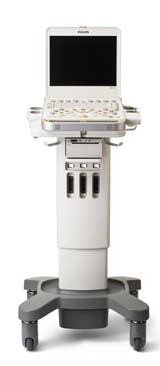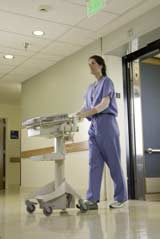Philips and Massachusetts Institute of Technology team up to make managing brain injuries less of a headache for doctors and patients
September 30, 2015
Research project combines ultrasound technology, computer modeling & neurosurgery experts to find a better way to measure intracranial pressure from the football field to the battlefield Cambridge, MA, USA – Royal Philips (NYSE: PHG, AEX: PHIA) today announced it has teamed up with the Massachusetts Institute of Technology (MIT) to research the use of Philips ultrasound technology and MIT physiological modeling as a less invasive way to measure intracranial pressure (ICP), an essential tool in managing patients with brain injuries. It could also allow doctors to use the measurement on less critical patients, who might not normally be considered for such monitoring. During the study, Philips will work with leading experts in the field of neurosurgery to test a core estimation algorithm that has been developed by the Integrative Neuro-monitoring and Critical Care Informatics Group in MIT’s Institute for Medical Engineering and Science (IMES). Today’s standard ICP measurement procedures require surgical penetration of the skull or lumbar spine and insertion of a catheter into the cerebrospinal fluid space or neural tissue posing a high risk of infection and damage to vital brain structures. Due to the invasive nature of the procedure, only a small number of patients who may require ICP monitoring are typically tracked and benefit from it – often those suffering from the most severe head injuries. This trial could create the opportunity to take ICP measurements in an expanded group of patients who would not routinely be monitored because of the health risks involved with measuring ICP. “The current invasive method of measuring ICP is used only in the sickest patients, but knowledge of ICP is potentially important in a much broader population,” says Thomas Heldt, the Hermann L.F. von Helmholtz Career Development Professor at MIT's IMES and assistant professor in MIT’s Department of Electrical Engineering and Computer Science, who is principal investigator of the study. “Our goal is to develop a noninvasive method of measuring ICP that could be used in treating a much wider range of conditions. This project gives us an exciting opportunity to test innovative hardware and modeling techniques at the bedside in real time." Over the next two years, Philips will work with MIT to research a fully non-invasive and calibration-free approach to estimating ICP and thereby enable better diagnosis and triage in cases where a patient has suffered a brain injury (football field, ambulance, battlefield, and emergency room). Using Philips portable ultrasound technologies and monitoring technologies, as well as the MIT model-based estimation approach, researchers hope to get the value of ICP without penetrating the skull. Further, researchers hope to expand the use of the technology to non-traditional patients, such as those with unexplained headaches, mild and moderate traumatic brain injury, or even coma patients, who normally would not have access to this type of procedure, but who could potentially benefit from it. Philips recently announced the opening of its new Philips Research headquarters for North America in Cambridge, Massachusetts, where it will perform these types of research projects in close collaboration with local academic and healthcare partners. Focused on understanding how medical technologies can be adapted to tackle some of society’s most pressing issues, Philips hopes that this type of research can lead to meaningful innovations that can help reduce care costs and improve patient results. “Today it is very difficult to gauge the level of head trauma someone has sustained at the scene of an incident, because there is no quick and effective way to gauge the pressure inside the skull,” said Dr. Joseph Frassica, Chief Science Officer of Philips Research North America. “Through this research, we hope to use the same technology most people associate with the first images of their child, in a way that has the potential to help us to differentiate a concussion from a serious traumatic brain injury and everything in between. Whether you’re a high school football player, in the NFL, a soldier in the battlefield, or unfortunate enough to be injured in an auto accident – we hope that this technology will give first responders a better way to determine if you have a life-threatening brain injury and allow faster and more accurate triage and treatment. By improving access and response times, these types of solutions have the potential to really impact patient outcomes.”

Philips Mobile Ultrasound Technology

Philips Mobile Ultrasound Technology

Philips Mobile Ultrasound Technology
About Royal Philips
Royal Philips (NYSE: PHG, AEX: PHIA) is a diversified health and well-being company, focused on improving people’s lives through meaningful innovation in the areas of Healthcare, Consumer Lifestyle and Lighting. Headquartered in the Netherlands, Philips posted 2014 sales of EUR 21.4 billion and employs approximately 108,000 employees with sales and services in more than 100 countries. The company is a leader in cardiac care, acute care and home healthcare, energy efficient lighting solutions and new lighting applications, as well as male shaving and grooming and oral healthcare. News from Philips is located at www.philips.com/newscenter.
.
